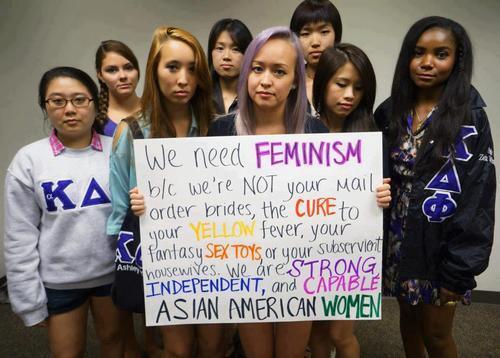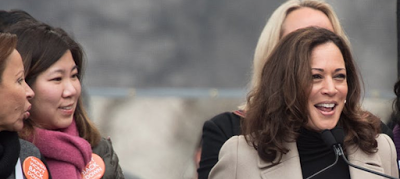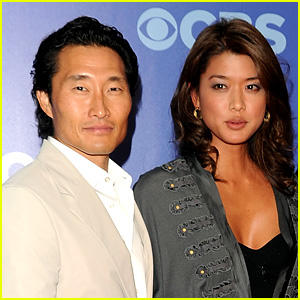By Ed Diokno
Views from the Edge
(Editor’s Note: We continue our countdown of the top 5 stories of 2017. Story number 4 is the resistance to President Donald Trump)
In 2017, Rose Tico, the Asian American character in Star Wars: The Last Jedi, stepped out of the background as a nameless mechanic and into the fray to become a hero of the Resistance.
2017 also saw the AAPI community stepping into the spotlight and playing crucial roles in fighting for the rights of all Americans.
One of best things Donald Trump did was to show how bad things can be for people of color, immigrants, the LGBTQ community, the disenfranchised and women. His mocking antics, is soft-pedaling of White supremacists and his out and out racism inspired people out of their comfort zones to get involved in fighting back.
The new Movement had been gaining momentum in 2016, but it wasn’t until this past year that it became evident that the quiet, subservient, silent stereotype of Asian Americans became officially dead. Through the internet, the community learned that they were not lone voices in the night, but instead, together, they became a mighty roar.
INTO THE FRAY
Trump and his policies inspired AAPI individuals, who a year ago were just ordinary people — housewives, doctors, real estate agents, students, chuck aside their comfort level as bystanders simply watching the country they love to run into the ground — to throw their hats into the ring by running for office.
Kathy Tran and Kelly Fowlert, both Democrats and political novices, ran for the Virginia state legislature, broke through that glass ceiling to become the first AAPI women to win seats in the state’s lawmaking body.
Manka Dhingra, a former senior deputy prosecuting attorney with the King County Prosecuting Attorney’s Office, won a special election for the state senate seat in Washington.
All four of the new legislators were inspired to run for office by the election of Donald Trump in 2016 and the kind of future their daughters might face.
“I ran because I couldn’t stand on the sidelines,” said Tran.
At the hyper-local level, AAPI citizens leaped into the fray, some say, for the soul of our country.
Yuba City, Calif. home to a large Sikh community, made history by becoming the first U.S. city to elect a Sikh American woman for mayor, Preet Didbal. Hoboken, NJ scored another first when Sikh American Ravi Bhalia was elected mayor. The first Filipina American took over as mayor in Daly City, Calif. Manka Dhingra was the first Indian American state senator in Washington. Gabriel Quinto, was not only the first Filipino American to become mayor in El Cerrito, Calif. but also the first openly gay person to hold that post.
All across the country, a younger generation of new faces ran for school boards and city councils creating a pipeline of energetic, locally connected Democratic officials gaining political experience for higher office.
LAW MATTERS
In the courts, AAPI legal professionals played central roles in slowing or thwarting the Trump tornado.
Two Asian American judges – Derrick Watson in Hawaii and Theodore Chuang in Baltimore – presided over the arguments fighting against Donald Trump’s executive orders to restrict immigration of Muslims. Twice they thwarted Donald Trump executive orders to restrict immigration from countries that were predominantly Muslim.
In the Hawaii case, Attorney General Doug Chin led the argument against the ban. In Baltimore, the Ahilan Arulanantham, a Sri Lankan, argued on behalf of the ACLU.
Jirayut Latthivongskorn, a Thai American medical student at the University of California Medical Center in San Francisco, is one of the plaintiffs in the lawsuit against the Trump’s action calling for the end of DACA.
In a precedent-setting decision, the U.S. Supreme Court ruled on the side of The Slants, an Asian American party band from Portland, Oregon. The band won its years-long quest to trademark their name. Ironically, the Slants victory allowed other entities, such as the NFL football team in Washington, continue to use its racist mascot.
PROTESTS
Long-established civil rights organizations such as the Japanese American Citizen’s League (JACL) and the OCA-Asian Pacific American Advocates joined their voices with newer more activist-oriented groups like the Asian Americans Advancing Justice and the National Forum for Asian Pacific American Women and others to protest Trump’s attempts to restrict immigration, thwart justice and equality, obstruct voting by people of color and do away with the Affordable Care Act.
They joined other civil rights activists in the marches against the Trump administration policies. You saw them in the Women’s March, March for Science, March for Truth, March for Workers,the People’s Climate March and of course – the Day Without Immigrants rally.
AAPI people joined the thousands who protested at the airports when Trump announced his first Muslim ban. Lawyers for agencies such as the ACLU and Asian Americans Advancing Justice provided legal assistance.
Vocal Asian Americans are on both sides of the affirmative action debate concerning the Ivy League universities. Depending on your point of view, Asian Americans are being “used” as a wedge against Latinos and Blacks, or they are fighting for equal treatment in admissions.
#MeToo
By not being afraid to speak out, four women of Asian descent have joined the #MeToo movement exposing the sexual misbehavior of powerful men in entertainment and politics.
- Ambra Battlina Gutierrez, a Filipina Italian model, was the subject of an expose in the New Yorker telling her allegations of how Harvey Weinstein tried to use his power and influence to seduce or coerce her into an act of sexual misconduct.
- Natassia Malthe, a Malaysian/Norwegian/American actress also told her horrific story of how the Hollywood power broker raped her.
- Leeann Tweeden‘s story of how she says Al Franken forcibly kissed her and groped her breasts while the Filipina American deejay was asleep, led to the resignation and shaming of the former U.S. Senator.
- Olivia Munn joined the #MeToo movement when she accused Brent Ratner, director for Rush Hour and wrote a powerful essay for Entertainment Weekly.
AAPI women were also in the forefront complaining about the sexist and mysoginistic culture of Silicon Valley, picking up a campaign that was launched by venture capitalist Ellen Pao the previous year.
Front page stories in newspapers and magazines and interviews on nationally viewed shows such as Megyn Kelly Today emphasized the hurdles and men’s humiliating behavior towards AAPI women trying to get funding for their startups.
USA Today’s front page story wrote:
“Though Asian women hold fewer of those jobs than Asian men, they’re employed in far greater numbers than other women of color, leading some to assume they do not face the same levels of discrimination as African Americans and Latinas… Yet research from Joan C. Williams, a professor at UC Hastings College of the Law, shows that Asian women report experiencing as much bias, and sometimes more, than other women do… And Asian women are the demographic group that is the least represented in the executive suite relative to their percentage in the workforce, according to a study of major San Francisco Bay Area tech companies by the nonprofit Ascend Foundation.”
Asian Americans and Pacific Islanders joined with other Americans in the Women’s March of last January, walking as individuals such as actress Constance Wu or as groups, such as the National Asian American Women’s Forum, the Filipino American activists of GABRIELA-USA and AAAJ, pouring out of the college campuses, suburbs and Chinatowns to express their opposition to the incoming administration.
AAPI labor leaders demonstrated at Speaker of the House Paul Ryan’s office in Washington that led to their arrests.
In 2016, a record number of AAPI politicians were elected to Congress, including three women senators. The growth of the Congressional Asian Pacific American Caucus seems to embolden the members as they stepped to the front on a number of issues.
All of the AAPI Senators and representatives didn’t hold back in their criticism of some of the policies of the Trump administration, on the subject of immigration, tax reform, equity and especially on the apparent tendency of the administration to give White nationalists a pass. When the White nationalists, KKK and Nazis collaborated with each other in Charlottesville, Trump had to be prompted to condemn their views and violence. However, his condemnation seemed hollow when the next day he also blamed some of those protesting the White supremacists.
In December, in support of the Dreamers and to remind the administration that Congress still had not introduce any legislation to protect the DACA recipients, Rep. Judy Chu, chair of the Congressional APA Caucus got arrested at a rally.

Cable news networks discovered that Asian Americans have views on the issues of the day. Rep. Ted Lieu and Senators Kamala Harris and Mazie Hirono became frequent guests of the cable news networks. Other Asian Americans began making appearances — Congressional staffers, policy wonks and journalists — not so much as people of color but as experts in civil rights, finance, media and politics.
Sen. Harris, whose mother is from India and father from the Caribbean, gained more attention than others as she is continually being mentioned as a possible candidate for president in 2020. The former Attorney General for California insists that she is not seeking the office. But her outspoken criticism of Trump policies has made her a favorite among the numerous news shows.
CULTURE CHANGERS
When NFL players took a knee, the few Asian American players and the two team owners of Asian descent spoke out in support for the players’ right to express their belief of the racial inequities that are playing out in our country.
The predominantly AAPI cast of Broadway’s Miss Saigon took a knee onstage to demonstrate their support for the professional football players.
Jessica Sanchez, an American Idol first-runnerup, knelt after singing the national anthem during a Raiders game but TV cameras chose not to show her act of defiance but the 70,000 fans at the Oakland Coliseum cheered on the Filipina American.
But it was in the realm of pop culture – movies, television, advertising, print media – that we are beginning to see the benefits of standing up and speaking out.
The 16th Annual Unforgettable Gala, celebrating Asian American trailblazers in the entertainment industry became a rally for equal rights. The #OscarsSoWhite movement morphed into new rallying cries of #Yellowface and #Whitewashing for the AAPI community.
 “Let’s not simply fight for inclusion, let’s set our bar higher,” said Daniel Dae Kim, who left Hawaii Five-0 in the Spring because of the pay disparity with his White co-stars. “If you’re a leader, you never have to beg for a place at the table because you’re hosting the dinner.”
“Let’s not simply fight for inclusion, let’s set our bar higher,” said Daniel Dae Kim, who left Hawaii Five-0 in the Spring because of the pay disparity with his White co-stars. “If you’re a leader, you never have to beg for a place at the table because you’re hosting the dinner.”
Likewise, his Hawaii Five-0 costar Grace Park who also departed from the successful TV series, said, “It’s beyond race, gender, religion, age or class; it’s about humans flourishing. That is what we should be going after.”
Kim has ventured into producing his own shows. The success of one such show, The Good Doctor, has given him the cache to have a hand in the casting of new shows that he is producing. You can bet that AAPI leads will be forthcoming.
The outstanding commercial success of the animated Polynesian-themed Moana and Kumail Nanjiani’s interracial surprise hit,The Big Sick, the critically acclaimed John Cho vehicle Columbus and the acceptance of TV series such Fresh Off the Boat, Quantico, Master of None, Into the Badlands and Disney’s deceptively progressive Andi Mack, have proven that shows with Asian leads or themes can cross over into the mainstream. Decision-makers in Hollywood appear to have come to the realization that Asians can play roles besides the best friend, the sidekick or the loyal servant.
As more AAPI actors and writers become producers we’re seeing more projects being proposed with Asian American leads. Mindy Kaling (The Mindy Project), Alan Yang (Master of None) and Daniel Dae Kim (Hawaii Five-0) all have projects in development with – at the very least – open to casting outside of the White, straight male mold that has dominated American TV’s culture thus far.
Casting agencies have no excuses anymore. They can’t say there isn’t enough AAPI talent in the business. They can no longer say White audiences won’t be able to relate to an Asian American cast.
“One of the primary reasons I became a producer is because I wanted to create the world that I wanted to see on TV,” Kim said, who is an executive producer on the series along with House creator David Shore. “So often as actors, we’re subject to the roles that we’re offered or auditioning for, but one role in one show is a small piece of a larger puzzle. It’s satisfying to me to be able to create worlds from the ground up. I can tell the stories I want to tell, I can populate them with the kind of people I would like to be telling them, and thematically it’s nice to be able to choose those stories. It’s also nice to be a job creator.”
The entertainment business is changing, but maybe it’s being pulled along by the industries around it that make up our popular culture. Advertising, fashion, marketing, merchandising, toy makers, comic books, mainstream media and social media are already strides ahead of the movies and television.
No where was this more evident than in the commercials shown during the Superbowl with themes of diversity and immigration. That’s advertising doing its best “persuading” on the minds of football fans.
Rose Tico may be a fictional character, but her positive impact on the minds of millions of young fans will be huge. Seeing an Asian in a great adventure, saving the universe.
Perhaps the best thing about 2017 is that it set up the stage for a huge 2018, with eight TV projects in various stages of development featuring Asian leads, a couple of Bruce Lee movies in the works, Oceans 8 will be released soon, starring Mindy Kaling and Awkafina alongside a half-dozen top-level movie stars and everybody is waiting for the August release of Crazy Rich Asians, which will feature that rarest of rarities for Hollywood productions — an all Asian cast.
Hopefully 2017 is a harbinger of things to come. If Asian America is truly “woke,” perhaps we can put to rest, burn it, bury it, stomp on it and erase it for once and for all — that demeaning monicker of the “silent minority.”
Related: Top Stories of 2017- Seattle Reverses Decision to Remove Manilatown from International District
AsAmNews has Asian America in its heart. We’re an all-volunteer effort of dedicated staff and interns. Check out our Facebook page and our Twitter feed, Please consider interning, joining our staff or submitting a story for consideration.


Hi,
RE: Top Stories of 2017″ President Wakes up Asian American Community: I just wanted to suggest a correction to the story: ” Ironically, the Slants victory allowed other entities, such as the NFL football team in Washington, continue to use its racist mascot.” The Washington football team was never in danger of losing their mascot nor their name, the litigation only had to do with their trademark registration. Even if the lawsuit to cancel their registration was successful, the football team would still not only retain their name/logo, but also have strong trademark protection and rights as well.
While it is true, the case unfortunately and and incidentally aided the team in their unfortunate use of the name, they were not going to change the mascot no matter the results of the Slants’ case nor their own. The only change that will be made must be done so at a market level, with the team’s ownership, or in the NFL itself.